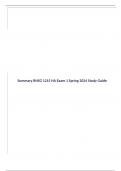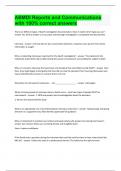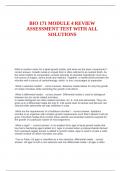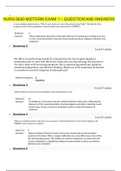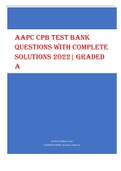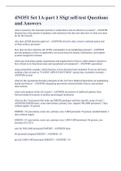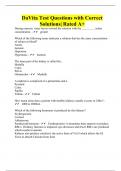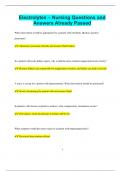Assignment 1 2024
Unique Number:
Due Date: 15 May 2024
(2 DIFFERENT ANSWERS PROVIDED)
1. Pluriversity
The concept of pluriversity is a forward-thinking approach within the philosophy of education
that challenges the traditional Eurocentric and colonial underpinnings of universities. In South
Africa, given its history of apartheid and colonialism, the philosophy of education has been
undergoing a significant transformation towards inclusivity and diversity. The term
"pluriversity" refers to an educational framework that acknowledges and integrates multiple
knowledge systems, cultures, and epistemologies, promoting a more holistic and diverse
DISCLAIMER & TERMS
academic OF USE (Odora Hoppers, 2009). This approach is particularly relevant in South
environment
1. Educational Aid: These study notes are designed to serve as educational aids and should not be considered as a
substitute for individual research, critical thinking, or professional guidance. Students are encouraged to
conduct their own extensive research and consult with their instructors or academic advisors for specific
assignment requirements.
2. Personal Responsibility: While every effort has been made to ensure the accuracy and reliability of the
information provided in these study notes, the seller cannot guarantee the completeness or correctness of all
the content. It is the responsibility of the buyer to verify the accuracy of the information and use their own
judgment when applying it to their assignments.
3. Academic Integrity: It is crucial for students to uphold academic integrity and adhere to their institution's
policies and guidelines regarding plagiarism, citation, and referencing. These study notes should be used as a
tool for learning and inspiration, but any direct reproduction of the content without proper acknowledgment and
citation may constitute academic misconduct.
4. Limited Liability: The seller of these study notes shall not be held liable for any direct or indirect damages,
losses, or consequences arising from the use of the notes. This includes, but is not limited to, poor grades,
academic penalties, or any other negative outcomes resulting from the application or misuse of the information
provided.
]
, For additional support +27 81 278 3372
(2 DIFFERENT ANSWERS PROVIDED)
1. Decolonisation
Decolonisation, in the context of philosophy of education in South Africa, signifies a profound
contestation and reimagining of knowledge production, educational content, and pedagogical
approaches. It demands a critical interrogation and transformation of the legacies of colonialism
within educational systems and curricula (Le Grange, 2016). The philosophy of decolonisation
in education questions the dominance of Eurocentric knowledge systems and advocates for the
integration and elevation of indigenous knowledge systems, thereby challenging and diversifying
the existing narratives and epistemologies taught in South African schools and universities.
This discourse has evolved significantly, particularly in the wake of South Africa's apartheid
history and its subsequent quest for a democratic and inclusive educational framework. Post-
1994, South Africa embarked on an educational reform process aimed at addressing the
historical imbalances and promoting equity and access for all. Despite these efforts, the
decolonisation of education remains a pertinent issue. It has gained renewed momentum with
the rise of student movements, such as #FeesMustFall, which not only demanded financial
accessibility but also called for a decolonisation of the curriculum, reinforcing the relevance of
this debate in contemporary educational contexts (Badat, 2016).
The concept of decolonisation is not without its controversies and debates. There is a spectrum
of interpretations about what decolonising the curriculum entails, ranging from the complete
overhaul of the curriculum to the integration of non-Western perspectives within the existing
structures (Mbembe, 2016). Critics argue that a wholesale rejection of Western epistemologies
might lead to educational isolationism, while proponents maintain that a truly decolonised
education is key to achieving epistemic justice and a pluriversal world where multiple
knowledges coexist (Ndlovu-Gatsheni, 2017).
Reflecting on the insights gained from analysing decolonisation in the philosophy of education,
it becomes evident that this is not merely an academic debate but a call to action. It implicates
ethical considerations about whose knowledge is deemed valuable and how histories and
cultures are represented or omitted in educational materials (Wa Thiong'o, 1986). This analysis
underscores the urgency of reconfiguring educational spaces to be more inclusive, equitable,
and reflective of a multitude of voices and perspectives.
, For additional support +27 81 278 3372
In conclusion, the journey of decolonising education in South Africa is ongoing. It requires a
collective commitment to dismantling the remnants of coloniality in education and fostering a
system that acknowledges and celebrates the richness of indigenous knowledge. The realisation
of this goal is critical not only for the transformation of the education sector but for the broader
project of social justice and nation-building in South Africa.
References:
Badat, S. (2016). Deciphering the meanings, and explaining the South African higher education
student protests of 2015–16. Pax Academica, 1(1), 71-106.
Le Grange, L. (2016). Decolonising the university curriculum. South African Journal of Higher
Education, 30(2), 1-12.
Mbembe, A. (2016). Decolonizing the university: New directions. Arts & Humanities in Higher
Education, 15(1), 29-45.
Ndlovu-Gatsheni, S. J. (2017). Decolonising the university in Africa: A paradigmatic shift. Oxford
Research Encyclopedia of African History.
Wa Thiong'o, N. (1986). Decolonising the mind: The politics of language in African literature.
James Currey Publishers.
2. Ubuntu
Ubuntu, originating from the Nguni phrase "umuntu ngumuntu ngabantu", directly translates to
"a person is a person through other people" and encapsulates a profound meaning within the
philosophy of education in South Africa. This African philosophy emphasizes communal
interdependence, respect, and compassion for others, striking a stark contrast against the
individualistic approaches prevalent in Western education (Le Grange, 2012). In the context of
South African education, Ubuntu advocates for a learning environment where communal
success is celebrated as much as individual achievement, fostering a sense of belonging and
mutual support among students (Waghid & Smeyers, 2012).
Over time, the concept of Ubuntu has evolved, particularly in its application within educational
debates in South Africa. Post-apartheid, the country faced the monumental task of restructuring
its educational system to be inclusive, equitable, and reflective of its diverse cultural heritage.
Ubuntu's ethos has been identified as a foundational pillar in achieving these goals, by promoting

